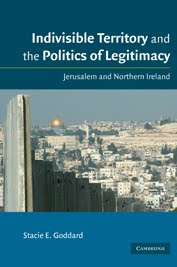 Stacie Goddard has a guest post at the IR Blog promoting her new book, Indivisible Territory and the Politics of Legitimacy:
Stacie Goddard has a guest post at the IR Blog promoting her new book, Indivisible Territory and the Politics of Legitimacy:
In international relations, territory often appears indivisible: actors are unable to divide territory through negotiation, shared sovereignty, compensation, or other mechanisms of division… As the site of competing national and religious claims, it may seem little wonder that Jerusalem, Northern Ireland, Kashmir and Taiwan are indivisible; how could it be any other way?… It’s exactly this conventional wisdom that this book attempts to challenge.My central argument is that indivisible territory is a social construct: far from being inevitable or inherent to territory, indivisibility is a contingent outcome, one that is very much the product of human action. When bargaining over territory, politicians engage in a contentious legitimation process: in making their claims to territory, actors use rationales that explain why their territorial demands are legitimate.
As elites attempt to outbid each they are likely to turn to rhetoric—what I call “legitimation strategies”—that will give them an advantage over their opponent. Politicians use rhetoric that will build support at home. They turn to language designed to coerce their opponent into accepting their demands. In most cases, these politicians are not trying to instigate violent, intractable conflict—they are simply using whatever legitimation strategies help them further their own political interests. But once used, legitimation strategies can have unintended consequences. Most notably, a politicians’ choice of rhetoric can lead to lock-in effects: by resonating with some actors and not others, legitimation strategies can trap actors into bargaining positions where they are unable to recognize the legitimacy of their opponent’s demands. When this happens, actors come to negotiations with incompatible claims, constructing the territory as indivisible.
Viewed in this way indivisibility is tragic, but hardly inevitable: how actors choose to legitimate their interests can either create or destroy the possibility of dividing territory. The book traces this process through two significant cases of indivisible conflict: Ulster (and then Northern Ireland), and Jerusalem.
I haven’t read the book yet, but reading the short description made me think of another paradox of territoriality and conflict: the myth that love of indivisible territory must lead to conflict obscures not only the menu of valid political choices for resolving political claims by dividing territory, as Goddard argues, but also the ways that the indivisibility of territory can be used to dampen conflict and promote nonviolent conflict resolution. It is often common love of place-ness that binds people together in civic nationalist communities. The Bosnian city of Tuzla, for example, managed to avoid major ethnic clashes during the war in ex-Yugoslavia because its mayor promulgated, and its citizens espoused, a view that its people are citizens of the same city rather than members of distinct ethnic or nationalist groups. So I think the relationship of territorial myth and identity to conflict outcomes is quite complex. I look forward to reading Goddard’s contribution.
Charli Carpenter is a Professor in the Department of Political Science at the University of Massachusetts-Amherst. She is the author of 'Innocent Women and Children': Gender, Norms and the Protection of Civilians (Ashgate, 2006), Forgetting Children Born of War: Setting the Human Rights
Agenda in Bosnia and Beyond (Columbia, 2010), and ‘Lost’ Causes: Agenda-Setting in Global Issue Networks and the Shaping of Human Security (Cornell, 2014). Her main research interests include national security ethics, the protection of civilians, the laws of war, global agenda-setting, gender and political violence, humanitarian affairs, the role of information technology in human security, and the gap between intentions and outcomes among advocates of human security.

0 Comments